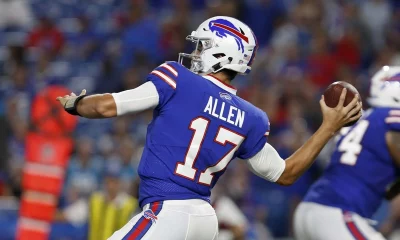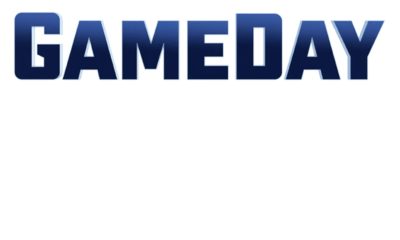I’m writing this after most of Week One’s games have concluded. There’s still the Monday night games to view and consider, but I’m not here to write about that.
I’m here to inform you, in very hushed tones and secretive, knowing whispers, about a long-standing threat to the NFL and its players. It’s possible that this looming disaster may play more of a role in redirecting your team’s fortunes than any other factor. It’s so insidious that it can strike your roster at any time, whether it’s as innocuous as a player getting out of bed, or working out at the team’s training facility.
(cue “Tubular Bells”)
I’m referring to the dreaded “I” word. We’re talking about…
INJURIES.
Every team has them. As any peewee player is aware, they happen, sometimes with undue frequency, because football is a sport that requires its players to undergo physical duress, often to extremes. Players are subject to impact and non-impact injuries alike. There are “soft-tissue” injuries, like ligament tears, as well as the typical assortment of broken bones. There are a number of ailments that can be described as “conditions” rather than injuries, like Plantar Fasciitis, “turf toe”, and “stingers”. There is, of course, an abundance of scrutiny regarding head and brain trauma, due to a number of former players still (allegedly) suffering from the hits and contact they experienced during their on-field careers. Simple ailments like the flu can dehydrate players and render them useless for periods of time.
We know all this, Rav. Why bring it up?
Each team, including even the lowliest also-ran franchise, has expectations every season. Two common sets of expectations: that a roster is good enough to compete for a championship, or worthy of next season’s number one draft pick.
When considering the former, every part of the roster is considered to be in place and functioning at an adequate level at minimum. Championship rosters rarely show weaknesses; they’re designed to be effective at every level.
The latter example is obviously never admitted to publicly, because that would invite PR disaster and accusations of deliberately tanking. The football-watching public knows it occurs with regularity (see Luck, Andrew, and the Indianapolis Colts), but it’s never to be brought into the open, because conceding defeat before actually playing the games indicates levels of subversion that well-intentioned teams aren’t supposed to engage in.
Jeez, Rav – tell us something we don’t know.
The winning/championship-level teams, should they actually win a championship, usually have one thing in common: few injuries. The roster has maintained itself and fulfilled expectations.
Tanking teams often have a multitude of injuries. Perhaps not at first, but the list of bottom-feeders grows throughout every season, forcing roster-shuffling and adjustments that often result in poor showings and players operating out of position…or worse. Losing a number of players to injury, particularly starters, often makes teams susceptible to signing inadequate free agents to fill the gaps, which can be problematic if a team is still hoping to contend.
Some examples from Week One:
- The Dallas Cowboys lost All-Pro WR Dez Bryant to a broken right foot for 4-6 weeks
- The Baltimore Ravens lost franchise sacks leader OLB Terrell Suggs to a torn right Achilles tendon, his second in the last four years, for the season
- The Carolina Panthers will be without stalwart MLB Luke Kuechly for an indeterminate amount of time due to a concussion.
All three of these franchises had designs on winning their respective divisions, if not a championship. Their rosters had been carefully and meticulously conceived, the product of many hours of scouting, coaching, and on-field execution, both in practice and games. While it’s far too early to predict that each franchise is doomed in their title quests as a result of their latest setbacks, there’s no denying that at least one if not several roster moves are required to compensate for the injured players’ absence. It’s entirely possible that the teams in question will be knocked from the playoff chase as a result.
So what? We already know who’s a contender and who’s not.
More examples:
- The Cleveland Browns lost starting quarterback Josh McCown to a concussion, time out TBD
- The New York Jets lost starting quarterback Geno Smith to a broken jaw, the result of a locker room altercation.
The Jets and the Browns are…um…not contenders. What’s interesting to note is the fact that the Jets’ backup QB, the well-traveled Ryan Fitzpatrick, actually gives the Jets a better chance to win on Sundays, because there’s little “Fitz” hasn’t seen in his career. The Browns had little choice but to insert media lightning-rod Johnny Manziel after McCown departed; to say that Manziel performed below expectations would be a gross understatement. Manziel looked more prepared than he did in his previous starting attempts, but that’s not saying much…if at all. (The Jets beat the Browns, by the way, 31-10.)
The above won’t change any observers’ impressions of either team.
What’s your point, Rav? We’re getting bored.
I’m trying to foster a general awareness of the fact that a single injury can radically – or subtly – change a teams’ fortunes. The odds of a Kurt Warner appearing out of nowhere to lead your team to a title are long indeed.
In the preseason, fans might want to consider reviewing their teams’ roster, identifying the areas that are crucial, and praying like hell that no injuries occur there.
Because as Cowboys, Ravens, and Panthers fans can tell you, they are wishing that they had.



















Facebook
Twitter
RSS